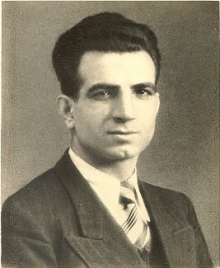Missak Manouchian
Monday, December 30, 2024
Missak Manouchian (1 September 1906 – 21 February 1944) was a French-Armenian poet and communist activist. An Armenian Genocide survivor, he moved to France from an orphanage in Lebanon in 1925. He was active in communist Armenian literary circles. During World War II, he became the military commissioner of FTP-MOI, a group consisting of European immigrants, including many Jews, in the Paris region which carried out assassinations and bombings of Nazi targets. According to one author, the Manouchian group was the most active French Resistance group. Manouchian and many of his comrades were arrested in November 1943 and executed by the Nazis in Fort Mont-Valérien on 21 February 1944. He is considered a hero of the French Resistance.
Manouchian was born on 1 September 1906 in Adıyaman, in Mamuret-ul-Aziz Vilayet, Ottoman Empire into an Armenian peasant family. His parents were killed during the Armenian Genocide of 1915, but he and his brother managed to survive. In the early 1920s he settled in an Armenian General Benevolent Union-run orphanage in Jounieh, Lebanon, then a French protectorate. He acquired education there and in 1925 moved to France.
Eventually, Manouchian settled in Paris, where he took a job as a lathe operator at a Citroën plant. During this period he was self-educated and often visited librariesin the Latin Quarter. He joined the General Confederation of Labour (Confédération Générale du Travail, CGT), a national association of trade unions which was the first of the five major French confederations. In the early 1930s, when the world-wide economic crisis of the Great Depression set in, Missak Manouchian lost his job. Disaffected with capitalism, he began earning a meager living by posing as a model for sculptors.
In 1934, Manouchian joined the French Communist Party. From 1935 to 1937 he edited the Armenian-language left-wing weekly newspaper Zangou, named after a river in Armenia. The newspaper was anti-fascist, anti-Dashnak, anti-imperialist and pro-Soviet.
Manouchian wrote poetry and, with an Armenian friend who used the pseudonym of Séma (Kégham Atmadjian), founded two communist-leaning literary magazines, Tchank ("Effort") and Mechagouyt ("Culture").They published articles on French literature and Armenian culture. The two young men translated the poetry of Baudelaire, Verlaine, and Rimbaud into Armenian, making many of these works available in Armenian for the first time. Both Manouchian and Séma enrolled at the Sorbonne to audit courses in literature, philosophy, economics, and history.
The following year, he was elected secretary of the Relief Committee for Armenia (HOC), an organization associated with the MOI (Immigrant Workforce Movement). At a meeting of the HOC in 1935, he met Mélinée Assadourian, who became his companion and, later, his wife.
Following World War II, Armenians were perceived in France positively "solely in the reflective light of Missak Manouchian, who played an important role in the French anti-Nazi resistance." Manouchian is a prominent figure in the bilateral relations between Armenia and France. In 2007, an exhibition dedicated to Manouchian was held at the Musée Jean Moulin in Paris in the scope of the Year of Armenia in France. On 21 February 2014, on the 70th anniversary of the execution of Manouchian and his group, a commemoration ceremony was held at Fort Mont-Valérien. Notable attendees included French President François Hollande, Armenian Foreign Minister Eduard Nalbandyan and prominent French-Armenian singer Charles Aznavour. On 13 March 2014, the Missak Manouchian Park was opened in central Yerevan, the Armenian capital, in attendance of Presidents Serzh Sargsyan and Hollande.
On 5 March 1955, a street named for the Manouchian Group was dedicated in the 20th arrondissement of Paris.
In 1978, a statue of Manouchian sculpted by Ara Harutyunyan was opened in the military cemetery of Ivry-sur-Seine, Paris.
A commemorative plaque was installed on 22 February 2009 at 11 rue de Plaisance, in the 14th arrondissement of Paris. The old hotel at this address was the last home shared by Manouchian and his wife, Mélinée.
In February 2010, busts of Manouchian were inaugurated in a Marseille, in a square named after him, and in Issy-les-Moulineaux.
Due to his communist ideology, Manouchian was immediately recognized as a hero in the Soviet Union. Soviet Armenian author Marietta Shaginyan described him as an "example of an Armenian who preserved his nationality, and at the same time became a class-conscious worker and a militant communist in his adopted country." Russian poet Sergei Shervinsky hailed him in a 1956 Ogoniok article as a "Fighter, Worker, Poet". A school in Yerevan, Armenia—founded in 1947—was named for Manouchian in 1963.





